
Lasius is a genus of formicine ants. The type species for this genus is the black garden ant, Lasius niger. Other major members, which live in drier heathland, are the cornfield ant, L. neoniger, and L. alienus. Other species include the temporary social parasites of the L. mixtus group and the hyper-social parasite Lasius fuliginosus. Lasius flavus is also a commonly seen species, building grassy hillocks in undisturbed pasture. In the Alps, these mounds - always aligned east to catch the first rays of the rising sun - have been traditionally used by goatherds as natural compasses. Species in the subgenus Acanthomyops, in particular L. interjectus and L. claviger, are commonly known as citronella ants due to their citronella-like smell.
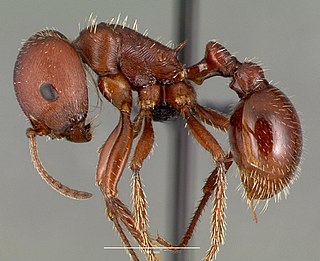
Pogonomyrmex is a genus of harvester ants, occurring primarily in the deserts of North, Central, and South America, with a single endemic species from Haiti.

Monomorium is a genus of ants in the subfamily Myrmicinae. As of 2013 it contains about 396 species. It is distributed around the world, with many species native to the Old World tropics. It is considered to be "one of the more important groups of ants," considering its widespread distribution, its diversity, and its variety of morphological and biological characteristics. It also includes several familiar pest species, such as the pharaoh ant and the flower ant.

Lasius alienus, or cornfield ant, is a species of ant in the subfamily Formicinae. Workers have a length of about 2–4 mm, Queens are larger (7–9 mm).

Lasius fuliginosus, also known as the jet ant or jet black ant, is a species of ant in the subfamily Formicinae.

Aulacopone is a genus of ant in the subfamily Heteroponerinae containing the single species Aulacopone relicta. The genus was described by Arnoldi (1930) from a unique dealate female collected at Ələzəpin (Alazapin), near Lankaran, in Azerbaijan S.S.R., Soviet Union, near its border with Iran. The specimen was taken in galleries of the formicine ant Lasius emarginatus, under the bark of an oak stump, in mid-montane forest.

Lasius arizonicus is a species of ant belonging to the genus Lasius, formerly a part of the genus Acanthomyops. Described in 1917 by Wheeler, the species is native to the United States.
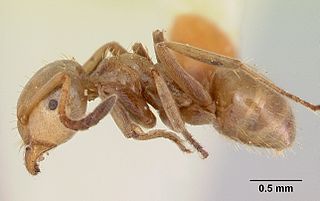
Lasius bureni is a species of ant belonging to the genus Lasius, formerly a part of the subgenus Acanthomyops. Described in 1968 by Wing, the species is native to the United States.

Lasius californicus is a species of ant belonging to the genus Lasius, and was formerly a part of the genus Acanthomyops. Described in 1917 by Wheeler, the species is native to the United States.

Lasius claviger, or the smaller yellow ant, is a species of ant belonging to the genus Lasius, formerly a part of the genus Acanthomyops. Described in 1862 by Roger, the species is native to the United States.
Lasius coloradensis is a species of ant belonging to the genus Lasius, formerly a part of the genus Acanthomyops. Described in 1917 by Wheeler, the species is native to the United States. The queens of will make a claustral chamber and hibernate, laying eggs in the spring.

Lasius creightoni is a species of ant belonging to the genus Lasius, formerly a part of the genus Acanthomyops. Described in 1968 by Wing, the species is native to the United States.
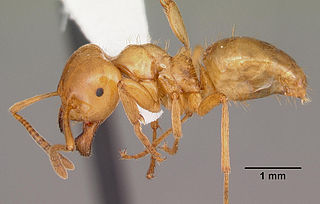
Lasius interjectus, commonly known as the larger yellow ant, is a species of ant belonging to the genus Lasius, and was formerly a part of the genus Acanthomyops. Described in 1866 by Mayr, the species is native to the United States.
Lasius mexicanus is a species of ant belonging to the genus Lasius, formerly a part of the genus Acanthomyops. Described in 1914 by William Morton Wheeler, the species is native to Mexico.

Lasius occidentalis is a species of ant belonging to the genus Lasius, formerly a part of the genus Acanthomyops. Described in 1909 by Wheeler, the species is native to the United States.

Lasius plumopilosus is a species of ant belonging to the genus Lasius, formerly a part of the genus Acanthomyops. Described in 1941 by Buren, the species is native to the United States, notably from the state of Iowa.

Lasius pogonogynus is a species of ant belonging to the genus Lasius, formerly part of the genus Acanthomyops. Described in 1950 by Buren, the species is native to the United States.
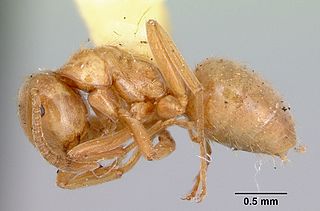
Lasius pubescens is a species of ant belonging to the genus Lasius, formerly a part of the genus Acanthomyops. Described in 1942 by Buren, the species is native to the United States.
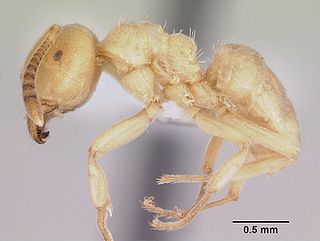
Lasius subglaber is a species of ant belonging to the genus Lasius, formerly a part of the genus Acanthomyops. Described in 1893 by Emery, the species is native to the United States and Canada.
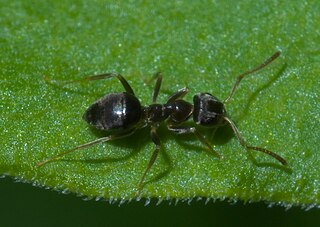
Lasiini is a tribe of ants in the family Formicidae. There are about 10 genera and more than 450 described species in Lasiini.


















